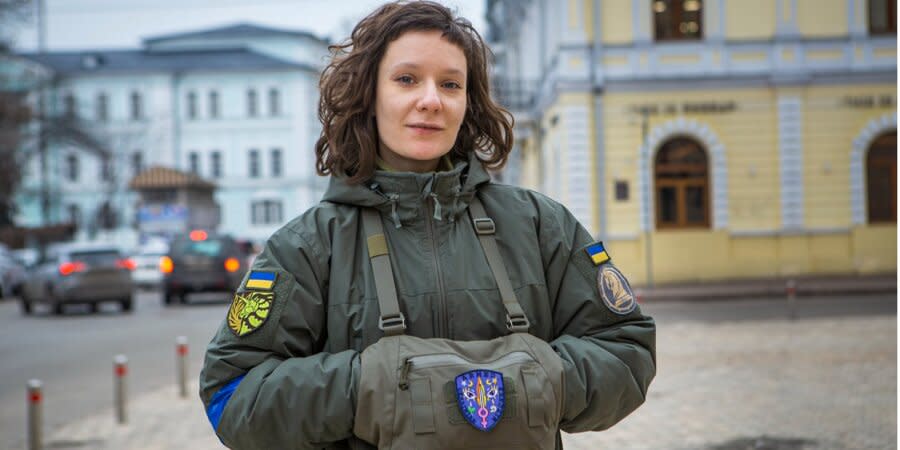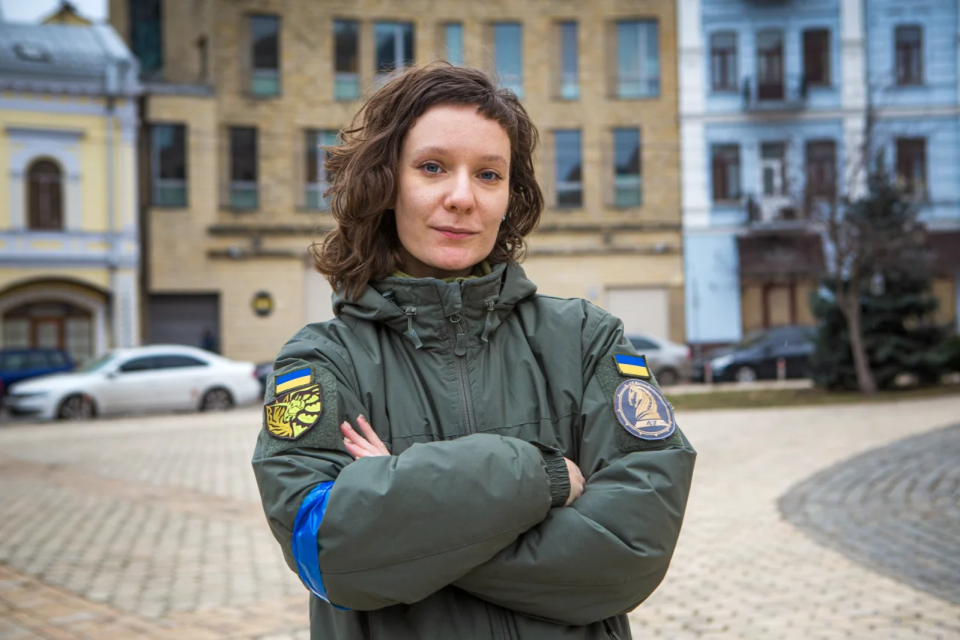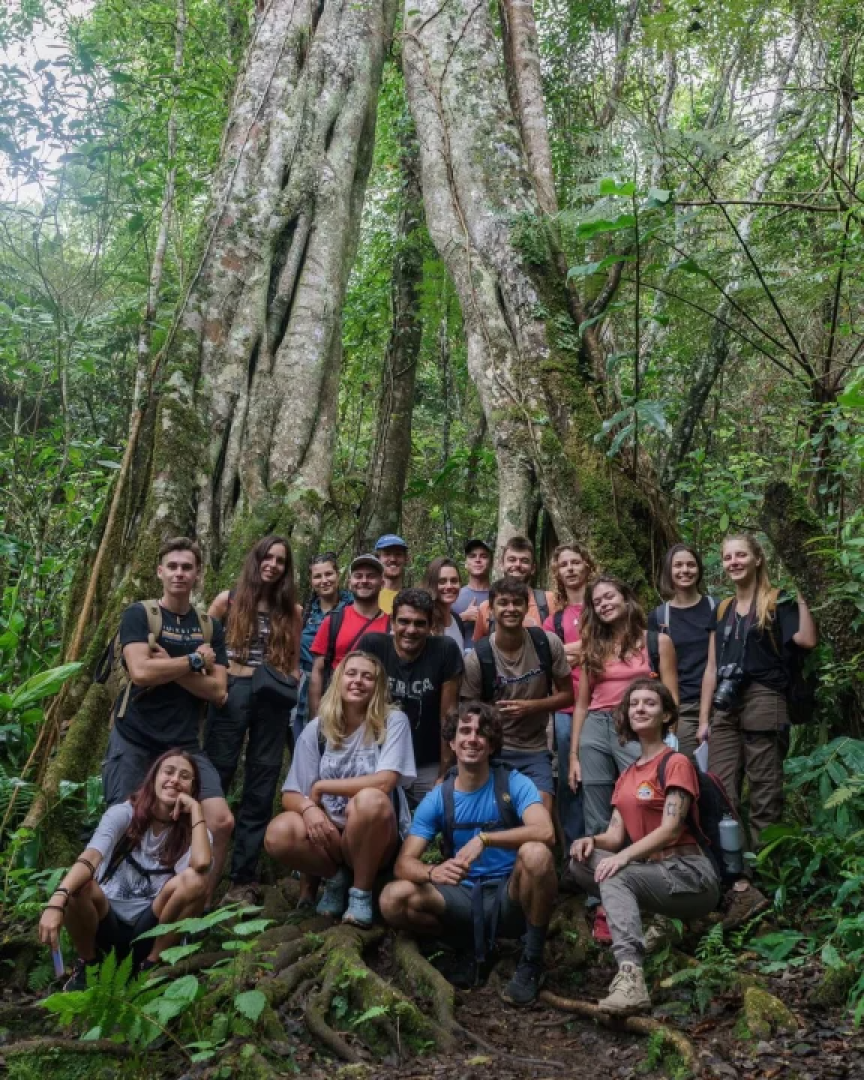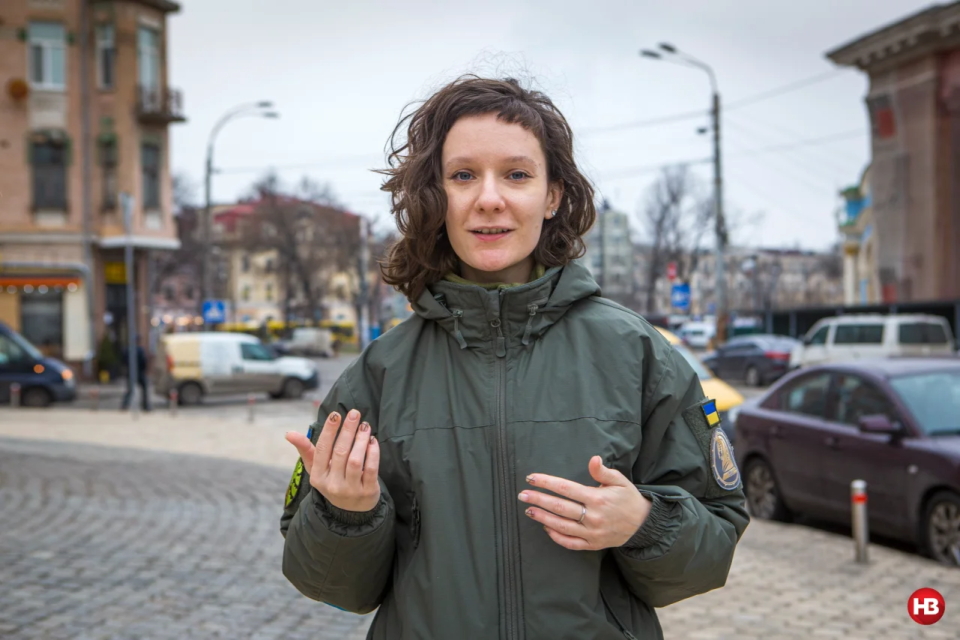How a Kharkiv LGBT activist and bat expert returned from Belgium to join the military

The New Voice of Ukraine continues a series of articles about the lives and struggles of Ukrainians on the anniversary of the full-scale Russian invasion on Feb. 24.
Anna Kazhan is a soldier of the 47th Separate Mechanized Brigade "Mahura". Kazhan (Ukrainian for “bat”) is not her real name. Before the outbreak of full-scale war in Ukraine, she was studying bats and researching bats, which is how her nickname came about. In her hometown of Kharkiv, she was also actively involved in LGBT activism and co-organizing KharkivPride.
Read also: How a Kharkiv LGBT activist and bat expert returned from Belgium to join the military
A few months after the full-scale invasion, Kazhan returned to Ukraine from abroad, abandoning her master's degree program in Belgium. She started volunteering and later joined the 47th “Mahura” Brigade.
In an interview with NV, she explains why she decided to devote her life to bats, tells how she was mobilized into the army, and recalls the last time she was in her native Kharkiv. We publish her story in the form of a monologue.

Peaceful life, love for bats, and LGBT pride
I’m originally from Kharkiv. In my civilian life, I’m a bat researcher. I love these animals because they’re unusual and unique.
In Kharkiv, there is the Ukrainian Bat Rehabilitation Center, where I started to get involved in the science of zoology. Thousands of bats are rescued there every winter — there’s no other center like it in Europe. For five years, I worked in education with children, with young naturalists.
Read also: Russian troops shell 17 settlements in Kharkiv Oblast overnight, wounding one
For the last two years, I was lucky enough to be on an international master's program where I studied tropical ecology and biodiversity. I had a long-standing dream to see bats not only from our ecosystem, but also from exotic ones. During my master's degree, I traveled to the island of Réunion, in the Indian Ocean, an overseas territory of France. There I climbed an active volcano while it was erupting. We explored these forests, including looking for the local bats.
I’m a part of the LGBT community, I position myself as a pansexual. This means that I have had and will have partners of different sexes and genders. These things are not too important for me, I’m open to different people. In Kharkiv, I was a co-organizer of KharkivPride. I feel comfortable in LGBT activism because I like activities where you can tell people about something and bring it closer to them. To make sure that both hate and prejudice disappear.
Generally speaking, I can say this: over the past two years, I have had many interesting, cool experiences that were ruined first by the coronavirus and then by the f***ing Rascists (Russian fascists).

Studies in Russia, Revolution of Dignity, and anticipation of great war
The Revolution of Dignity was such a turning point for me personally, and I think for my generation in general. Back then, people felt that there was some greater evil to fight against, and that it was our job.
I was quite young then — 21 years old. It was at that time that I first felt that there were values for which I was ready to die. Of course, this is a certain moment of euphoria, hormones, and the body's reaction to stress. But it was there, in the center of Kyiv, nine years ago, that I first wrote my blood type on my hand. This experience makes you a different person. It was the first step towards realizing that perhaps my life would be short and troubled.
My father is Russian. When the ATO (anti-terrorist operation — the outbreak of the war in Donbas in 2014) first started, I was finishing my master's degree in St. Petersburg. Now it sounds crazy to me, but it was a completely different time and a different vision. There was no feeling then that you could go against your parents' will and do something.
What I can remember from those days is that when I was still in St. Petersburg, I used to hang the Ukrainian flag from the Palace Bridge in the middle of the day. It was a whole special operation. I went to my graduation there in a vyshyvanka (Ukrainian embroidered shirt -ed.).
Now I clearly know that it is better not to have any dealings with Russians — just sever them from yourself. For some people, this is just a fashion trend, but for me it is a very clear and balanced decision.
In the winter of 2022, I came home from Belgium to Kharkiv for the winter vacation. I remember packing go-bags for myself and my mom, but my mom just laughed at me and ate all the food I put in them. That annoyed me a lot. At the same time, together with my then-girlfriend, I took a TacMed course at Nakypilo, an independent Kharkiv media outlet that was and is a center of motivated people. At the time, she was studying in Poland.
At the end of winter, I had to return for the academic semester. I realized that if I went back to Belgium, I would be running away from the war. It was uncomfortable and difficult for me. My psychotherapist said that if I wanted to invest in the victory of Ukraine, it would be better to do it from the non-occupied territories. What's the point of sitting in Kharkiv and waiting for the war? I should go back to Belgium, and if something happens, I will come back to Ukraine again.
That's what I did. My girlfriend also went to Poland. There, in Lublin, I spent a last quiet weekend with her. At that time, there was already this premonition of war, like an elephant in the room. You go to the movies, have breakfast, celebrate Valentine's Day, explain to yourself that you are abroad just because you decided to. But in reality, you appreciate what’s going to happen.

Read also: Britain confirmed to host Eurovision 2023 instead of Ukraine
Full-scale war, returning home, and volunteering
I was in Belgium at the outbreak of the full-scale war. I remember reading on Twitter that Google Maps showed a traffic jam that stretched from the Russian city of Belgorod all the way to Kharkiv. A traffic jam on Google Maps means that a large number of phones have been spotted in one place. At first I thought it was some kind of "skirmish" in Hoptivka — some kind of local commotion. Then I realized that it looked like an invasion.
I went to bed because I realized that the following day would be tough. The next day I woke up and saw a message from my Belgian supervisor. It read something like this: "Dear Anna, given the circumstances, you can manage your time as you wish." And I think to myself: what kind of circumstances? Then I open a message from my Italian friend. And there it is: "Oh my God, they bombed a bunch of cities in Ukraine, the war has started." No matter what you expected beforehand, it was still hard to comprehend.
The day before the full-scale war started, on Feb. 23 (2022), I gave an interview to the Austrian magazine Vangardist. It's a queer magazine, and they were doing a piece about how Kharkiv lives in anticipation of all these events. During this interview, I talked about the Izolyatsia prison (in already occupied Donetsk — ed.). I said that in any case, (the Russians) would first kill activists from an already drawn-up list. And when it all started, I received a message from this magazine, saying that they should quickly publish the interview as it was, without waiting.
I followed the news, what was happening at Azovstal. I followed the performance of Kalush at the Eurovision Song Contest 2022, when they made their statement. This (Eurovision) was such a festivity for everyone, and then they told the truth about what was happening, and all this picture, all these sparkles, everything breaks, crumbles. And you realize that no matter where you are, no matter how safe you are, this is what is happening to your land, to your people.
Read also: Belgium to send its largest arms package to Ukraine
Just a couple of days after that, I packed my belonging and left for Lviv. Somewhere at a subconscious level at that moment I already knew that I wasn’t going to return to Belgium. When I arrived in Ukraine, I volunteered with doctors at the train station for a couple of weeks, and then decided to go to Kharkiv. I planned to stay for five days, to record bats as part of a study. However, when I arrived, it lasted for two-and-a-half months: I volunteered there, translated, and travelled with my friends closer to the front, to Zolochiv in Kharkiv Oblast. There are grain warehouses there, and together with journalists we made stories about how farmers work in the local fields.
In general, my impression over the past year is that even the worst nightmares are possible if Russians come to our land.
Decision to join army, 47th ‘Mahura’ Brigade, non-discriminatory approaches, and mutual respect
Closer to the fall (of 2022), I realized that in order to reach the edge of my capabilities and convert my energy into victory, I needed to join organized structures — the army. Because this is the only way we can continue to survive.
So, I joined the Armed Forces in early September. It was funny because the medical examination took place in my kindergarten. So on Sept. 1, I came to my kindergarten to join the army. Because this war is going to last for a long time, each person needs to consider for himself or herself the scenario of his or her life in which he or she goes to the army. And to prepare for it as much as possible in terms of resources, information, and physically. Because this is our reality.
It was important to me that Valerii Markus, the chief sergeant of the 47th Separate Mechanized Brigade "Mahura", communicates the values of non-discrimination in his brigade. He wrote on his social media pages that he doesn't care what your sexual orientation, religion, or gender is, if you’e ready to work, come to us. Indeed, the communication of the chief sergeant does not mean that my entire experience in the army will be exactly as described in the post. But I realized that if I wanted to try my hand in the Armed Forces, I would probably feel most comfortable in this unit.
At that time, it was still the 47th Regiment. I thought I was going to be a medical orderly, because that was the position Valerii Markus had assigned to me at the interview. However, due to the imperfection of the legislation, I had to decide at some point: I want to be in a combat position, or I want to be in the 47th “Mahura” Brigade. This is because I did not serve, I never had basic military training. I could have gone to a training center where I would have been prepared for combat positions, but it was not a given that after that I would have returned to the 47th "Mahura" Brigade.
I wanted to go there, so I joined them as a clerk at the headquarters. As it turned out, in some aspects it was even more difficult than serving as a soldier in the unit. All those months that I have been in the army, I’ve been working every single day. Recruiting, that is, recruiting and training new fighters, involves a lot of paperwork. It is also a lot of crisis communication. I have to be very attentive to details and situations, and it is important to be able to convey information quickly and correctly.
Looking ahead, I can say that my expectations have been met: I have not encountered discrimination and, on the whole, my environment is tolerant. Of course, there are people who might say something like: "I'm a normal person, I'm against it (LGBT)." But no one picks a fight with you.
I even have one man in my unit who was a far-rightist and used to be on the other side of the police cordon from me during KharkivPride. Now I’ve met him on the same field. In fact, I really want us to have a pluralism of opinions, and to learn to respect each other in the future, after what we’re experiencing now.
Read also: Eight people in Kharkiv injured in latest missile attack, says governor
Valerii Markus' lecture and new approaches to communication in the army
I think all the changes that Markus proposes are very important. But I also realize that some traditions in the army are not so easy to change. Even some of the minor points — for example, when he suggested calling problems challenges, or addressing others not as "Mr. or Mrs." but as "pal." For some people, this seems like something very exotic. Not everyone believes that they joined the army for self-development. But for me it is important, because it helps me not to turn my days in the army into a groundhog day.
To keep myself going, as Markus said, I try to find something in every day that I can be proud of or that makes me happy. And I think it's very important to really communicate these things to the personnel. The problem is that personal experience is difficult to convey to others through orders.
Read also: SBU exposes Russian agent responsible for strikes on Kharkiv
Kharkiv
I have a ring that reminds me of Kharkiv. It has the symbol of Kharkiv, Derzhprom (office building in central Freedom Square - ed.), on it. It has a very interesting history. It was the first so-called skyscraper in our region, built before the First World War, it has survived a lot and is still standing. It is important both as a TV center and as a place where various institutions operate.
In addition, for me personally, this place is associated with bats. The Derzhprom building stands on a large square and looks like a huge rock. It has a lot of cracks in it, precisely because it is so old, and tens of thousands of bats hibernate right there.
Once upon a time, at Derzhprom, we had a good case of interaction between people and scientists. People are often afraid of bats. Many years ago, the janitresses used to collect these bats, put them in a bucket, and then shake them out onto the snow and mash them into pulp with a metal scoop. They had such a prejudiced attitude toward bats, as if they were contagious, drinking (human) blood, and so on. And this was simply because they were not educated enough. We worked with them and taught them that bats are not scary and should not be treated like that.
During all this time, I only came to Kharkiv for one weekend. It was Jan. 7-8 (2023), and it hurt me to see the city so devastated, so quiet. It was a pity that many of my friends had left. These are normal processes — I understand them completely — and I think the situation will change closer to spring. Because, generally speaking, it's quite depressing everywhere in winter.
Even though I was hurt, I still feel that Kharkiv is my hometown. It was so, and will remain so.
We’re bringing the voice of Ukraine to the world. Support us with a one-time donation, or become a Patron!
Read the original article on The New Voice of Ukraine

